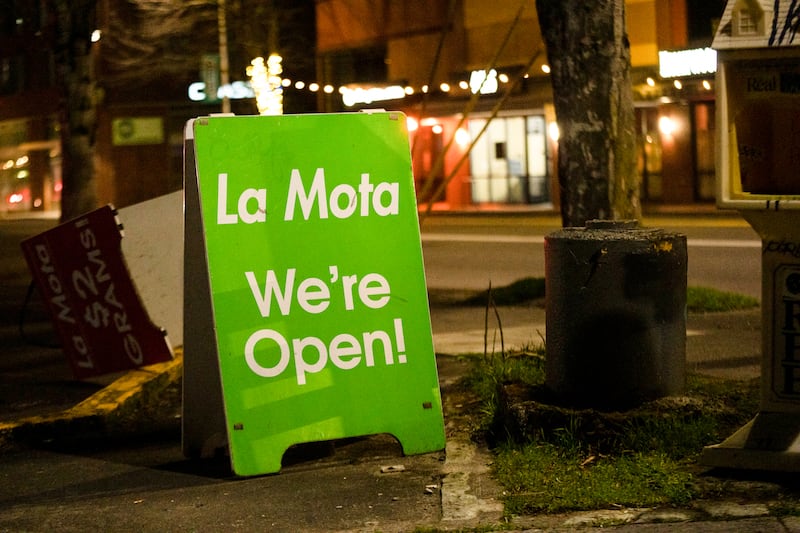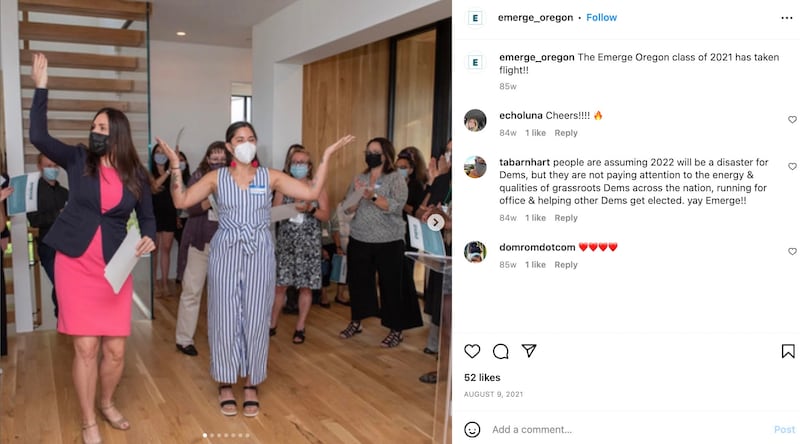On a crisp evening last May, Rosa Cazares threw a party.
It was a fundraiser for Oregon gubernatorial candidate Tina Kotek, hosted in a 7,048-square-foot home in Portland’s Northwest hills. Gathered around a glass and oak stairway that spiraled to the second floor, guests sipped from champagne flutes and sampled charcuterie.
The gathering was thanks to La Mota, the second-largest cannabis dispensary chain in Oregon.
Cazares, 34, and her longtime partner Aaron Mitchell, 45, have a high profile in the cannabis industry. La Mota, the chain they founded, grows weed on Oregon farms, makes extracts and vapes, and sells products at 32 La Mota-branded dispensaries across the state.
Between them, Cazares and Mitchell are listed in business filings as manager, registrant or member of 72 limited liability companies, or LLCs, many bearing the La Mota name. Each dispensary operates under its own LLC.
An industry expert estimates companies under the La Mota brand have sales of more than $40 million a year. Cazares regularly adorns the covers of weed magazines in an industry dominated by men.
Her involvement in politics is equally noticeable: She serves as vice chair of Emerge Oregon, a training academy for women seeking elected office—and has told people she has an eye on high office herself.
“She is really smart and thoughtful,” says former House Majority Leader Barbara Smith Warner (D-Portland), who attended Cazares’ parties. “She seems like a smart businessperson.”
Cazares hosted several fundraisers and political gatherings at the Northwest Portland home—two for Oregon Secretary of State Shemia Fagan, one for Multnomah County Chair Jessica Vega Pederson, and another for Kotek. She co-hosted a black-tie gala for Kotek at Hotel DeLuxe on the brink of her winning the governor’s office. During the election year of 2022, La Mota became a regular sponsor of events for Democratic Party candidates.
“She’s kind of a unicorn,” says Meghan Walstatter, a friend of Cazares’ and a fellow cannabis business owner. “There’s only one Rosa.”
But the party that May evening illustrated the central mystery of La Mota and its owners. On the one hand, the chain and its founders exude success, a willingness to expand quickly, and a history of being generous with political contributions.
But WW has learned that beneath the trappings of success, there are problems.

Many guests at the party that night said they believed the home was owned by Cazares and Mitchell. But the couple were, in fact, renting the house from Eric Breon, the founder of Vacasa, who since that event has sued them twice in Multnomah County Circuit Court, alleging seven months of unpaid rent and extensive damage to the home. The most recent lawsuit alleges Mitchell and Cazares left cat urine and feces strewn across the floors.
More troubling, the Oregon Department of Revenue has issued tax liens of more than $1.6 million against Mitchell, Cazares and La Mota companies since 2018, including at least $621,000 in cannabis taxes dating back to 2016.
And, on the federal level, the IRS placed liens on Cazares and Mitchell in March and November last year, totaling $1.4 million for nonpayment of personal income and employment taxes.
Determining the scale of Cazares’, Mitchell’s and La Mota’s troubles is complicated by its maze of LLCs.
Altogether, Cazares, Mitchell and several La Mota entities have faced 30 lawsuits filed in Oregon circuit courts since 2017 that collectively allege more than $1.7 million in unpaid bills from cannabis vendors, handymen, testing labs, and even the accounting firm hired to complete 2021 tax returns for all of the LLCs.
While the entire cannabis industry is reeling from too much supply and not enough demand, observers say La Mota is in a different league.
Some think it’s approaching a day of reckoning.
“It’s really easy to run a successful business when you don’t pay bills to vendors you buy from,” claims Colin Hobbs, chief revenue officer for cannabis product company Buddies. “You can only burn so many bridges.”
In Oregon, perhaps you can burn quite a few. The story of La Mota isn’t simply one of a company’s struggles. It points to serious lapses of oversight by the Oregon Liquor and Cannabis Commission. While the embattled state agency endures a media circus over a few bottles of Pappy Van Winkle bourbon, it also appears unwilling to carry out a central purpose of its existence, which is to regulate the cannabis industry and protect small businesses and Oregonians.

According to interviews Cazares and Mitchell gave to journalists years ago, the two moved to Oregon from Florida in 2009 to break into the medical cannabis world, six years before the state legalized recreational cannabis.
Cazares dazzled those who met her. A slim woman with long brown hair, she favored black pencil skirts and exuded confidence.
By contrast, Mitchell dressed like the skateboarder he once was: loud sneakers, baggy jeans and oversized hoodies.
In the early 2000s, Mitchell spent time skateboarding competitively, hanging out with skateboarding legends like Jeron Wilson, co-owner of clothing brand Diamond Supply Co.
But much of Cazares and Mitchell’s past remains a mystery.
The couple’s LinkedIn profiles are notable for what they don’t include: educational background, prior work history or much of anything. That’s unusual in an industry where people are usually eager to establish their bona fides.
During reporting for this story, WW received a letter from Amy Margolis, La Mota LLC’s attorney. Margolis threatened legal action against the newspaper if it continued asking questions that Margolis considered inflammatory and inappropriate, and published information it received.
Willamette Week’s reporting, Margolis wrote in her letter to WW, was harming her client. “The negative impact is already being felt by them. Ms. Cazares, as a first generation American and woman of color, feels targeted as this would be the second [WW] story about La Mota since the beginning of 2023,” Margolis wrote. “If the paper should continue, or any information is published that places my clients at any personal risk of injury, we will take immediate legal action.”
She also sent a letter to one former contractor, threatening legal action if they shared certain information with WW.
On March 8 and again on March 24, WW sent written questions to Margolis. She and her client have declined to respond. As a consequence, the reporting for this story is a result of examining hundreds of public records and conducting more than three dozen interviews.

In Florida, Mitchell appears to have spied a business opportunity in the mid-aughts.
Property records show he purchased at least 20 homes, most in one of the poorest sections of Daytona Beach, in the wake of the 2008 recession, some for as little as $10,000. (He purchased others prior to the recession.)
According to tenants’ testimony filed in court, roofs leaked, electrical systems failed, wires stuck out where home appliances had once been, and sewage flowed into yards.
Over a span of four years, court records show, Mitchell and an associate filed eviction complaints against 28 people from those homes. Six of them handwrote letters to the judge disputing the evictions. Three claimed they’d never signed a lease.
“I’m five months pregnant and cannot work anymore,” one woman wrote. “I’ve been trying to find another job, or find housing assistance, but am having no luck with any of it.” Five days later, the judge instructed the local sheriff to remove her.
It’s unclear how many of the Daytona Beach homes Mitchell still owns.
Mitchell told the trade magazine Marijuana Venture in 2017 that he had sold all of the couple’s assets in 2014—including his and Cazares’ cars—to buy an old laundromat in Southeast Portland to turn into their first medical cannabis dispensary. Mitchell said he and Cazares slept on the floor of the building for a time as they fixed it up.
Mitchell purchased several properties across Oregon and gave each a face-lift, painting the showrooms of each dispensary a bright white. “I’m aiming to have the most retail stores in the world,” Mitchell, then operating 15 stores, told the same magazine in 2017. “And I want to have that title for a while.”
During that time, the couple bought a modern home in North Portland; Mitchell had already purchased a home in Shady Cove, Ore., in 2011. Mitchell drove a rented 2015 Maserati Ghibli; over the next three years, he and Cazares cycled through the newest Mercedes-Benz models, according to DMV records. Mitchell later drove a Ferrari.
By 2019, the La Mota chain held 20 dispensary licenses.
While Cazares became the face of the company, Mitchell continued accumulating properties. According to an examination of Multnomah County property records, Mitchell spent $3.7 million between 2017 and the end of 2022 buying at least nine properties in Portland alone. (Mitchell, and entities controlled by Mitchell and Cazares, came to own at least 39 properties across Oregon.)
Property records show only one of the properties had a recorded mortgage, suggesting Mitchell usually paid in cash.
In fact, according to six cannabis vendors that did deals with La Mota, Mitchell paid in cash when restocking the stores, too.
Mitchell asked one vendor in a text to keep La Mota invoices under $10,000.
“Aaron’s model is different from other large companies’,” says Joel Klobas, a top executive for Chalice Brands, a large cannabis company, “because a lot of his deals are done with cash.”
That puzzles some. “It’s hard to imagine at this point why someone wouldn’t have banking, because it’s available,” says Stuart Wilson, co-owner of the edibles company Drops. (More than one credit union on the West Coast now accepts deposits from cannabis companies.)
“La Mota expanded quickly,” says economist Beau Whitney, who follows the cannabis industry. “They set up warehouses and distribution, and because they were buying in volume, they could demand lower prices. They were price makers, not price takers.”
Today, La Mota entities hold a combined 37 retail licenses. That’s five fewer than Nectar, the largest dispensary chain in the state, and 20 more than Chalice. Like other large cannabis companies, La Mota does it all: grows cannabis at its indoor and outdoor farms, processes bud into extract, and sells dabs and vapes under La Mota brands.
Nectar and Chalice are also vertically integrated: They grow, process and retail cannabis. But there’s a big difference: Those two companies explicitly tapped outside investors for their capital. (Chalice is publicly traded.)
Where Cazares and Mitchell got their money still baffles those around them. On multiple La Mota forms filed with the Oregon Liquor and Cannabis Commission in which Mitchell is listed as the primary contact, “other” is listed as the funding source. The application for its Johnson Creek dispensary lists three former professional skateboarders in Los Angeles as managing members. Reached by WW, one of them said they had never invested any money in La Mota—and hadn’t spoken with Mitchell in years. The spouse of a second said the same. The third did not return calls.
Another investor Mitchell cited in 2017, when reached by phone, said curtly he was no longer involved. “Early on, definitely,” said Jeron Wilson of Diamond Supply. “But not anymore.”

Records show that since 2018, the Oregon Department of Revenue has filed at least $621,000 in liens for unpaid cannabis taxes against Cazares, Mitchell and LLCs of which the two are listed as members or managers. (Taxing authorities file liens to secure a claim against the assets of taxpayers who fail to pay their taxes.)
The state also issued liens totaling $893,000 against Mitchell for personal income taxes dating back to 2014 and another $355,000 against Mitchell and several of the LLCs of which he is a member for miscellaneous taxes.
The IRS issued two tax liens last year totaling $1.4 million, including for Mitchell’s personal income taxes between 2015 through 2019.
It is unclear why the couple and the entities they control have failed to pay their taxes on time, according to tax authorities, but it’s a longtime problem. In an email to the OLCC in May 2018, Cazares wrote that two special agents from the IRS contacted her and Mitchell “accusing us of tax crimes.” She called it a “nightmare” and wrote that “we feel we have not committed any tax crimes that we know of.” The IRS declined to confirm any current or past investigation.
It’s unclear from public records what portion of the back taxes have since been paid, though records show at least $137,000 in delinquent cannabis taxes have been paid. The state Revenue Department will not answer questions specific to any taxpayer.
While tax authorities asserted liens for allegedly unpaid taxes, vendors filed lawsuits seeking payment for allegedly unpaid bills. Court records show that Cazares, Mitchell, and entities they control have been collectively sued 30 times in Oregon circuit courts since 2017, including by five cannabis companies that allege failure to pay more than $1.2 million for products. Thirteen cases remain unresolved; three have trials scheduled for this year or next.
Buddies, a vapes, oils and flower company, first sued Cazares, Mitchell and 27 LLCs they control in November 2019, alleging failure to pay for $717,000 worth of product. Midway through the lawsuit, La Mota’s attorney at the time—Alex Tinker of Tonkon Torp—withdrew. (The parties eventually settled.)
Tinker wrote in a filing that his clients “insisted on taking actions related to this matter with which I have fundamental disagreements, and have failed to fulfill their obligations to me.”
Chalice sued La Mota LLC five months later, alleging the company failed to pay for $137,000 worth of delivered product. The case remains open.
Last fall, the gummy company Drops alleged in a lawsuit filed in Multnomah County Circuit Court that Cazares, Mitchell and separate La Mota LLCs failed to pay $390,000 for product delivered over a span of two years. Drops also alleges fraud and unjust enrichment. “Defendants have a pattern and practice of building their business by defrauding vendors,” Drops’ filings read, “with no intention of paying invoices that demonstrates Defendants’ fraudulent conduct and longrunning scheme.” The case remains open.
Nathan Howard, co-founder of East Fork Cultivars, claims the company has a reputation for not paying for product.
“Instead of closing up shop because the fundamentals of their business don’t work,” Howard says, “they decide to stay in it and abuse their power.”
Related: Former employees allege La Mota failed to protect them from armed weed bandits.
Rose City Laboratories, which tested La Mota’s products for pesticides, filed suit through a collections agency in November 2022, claiming $31,000 in bills had gone unpaid.
So did a couple who performed handyman work on more than 10 La Mota stores, a labeling company, and a heating and cooling business. The landlord of La Mota’s Hollywood dispensary recently sued it for nonpayment of rent, alleging in filings that the “defendant entered upon the premises with force or is unlawfully holding the premises with force.”
Even the firm hired by La Mota to file its 2021 taxes, the Michael Larson Company, sued in Clackamas County Circuit Court. The lawsuit paints a picture of a company in disarray.
The tax firm alleged La Mota’s financial record-keeping was “in shambles” and that many of La Mota’s subsidiary companies had “missing or incorrect” financial records. “Defendants had engaged in a number of questionable business practices,” it asserted.
The tax firm alleges La Mota refused to pay $154,000 for work completed. Trial is set for May.
While cannabis companies of all sizes are hurting, La Mota’s similarly sized competitors do not face the same scale of legal difficulties. Records show Chalice has been sued three times in Oregon circuit courts; Nectar four times. Neither company appears to have been issued tax liens by the Oregon Department of Revenue.

To some observers, the central question is why the Oregon Liquor and Cannabis Commission—the cannabis regulatory agency with a $200 million annual budget and 380 employees, including sworn enforcement officers—would keep granting a chain like La Mota more retail licenses despite its owners allegedly owing government agencies and vendors millions.
OLCC board chair Marvin Révoal, appointed to his post by Gov. Kotek last month, says he had no idea whether La Mota was in financial disorder, and was “surprised” by the amount of money La Mota allegedly owes, but Révoal stopped short of saying the agency should take that into account when considering an application for a new license.
Révoal says La Mota’s situation has renewed questions about what authority the OLCC has over licensees—and if it’s enough: “How far can we look, legally, morally?...That’s a top-of-the-line question, now, to ask. Should we be looking at this?”
The other five OLCC commissioners would not return WW’s phone calls or emails. The agency did not make its interim director, Craig Prins, available for an interview because he’s traveling.
Agency spokesman Mark Pettinger says the OLCC is bound by statute in what criteria it can use to deny a license application. But several administrative rules would appear to apply to La Mota entities, including “financial responsibility.”
And Oregon law states the OLCC can revoke a license if it fails to “pay the tax as required twice in any four consecutive quarters” and if the Department of Revenue “has issued to the licensee a distraint warrant.” The department can contact the OLCC when a licensee is delinquent on its taxes. Neither the OLCC nor the Department of Revenue would say if any La Mota licensee had ever been the subject of such outreach.
State Rep. Pam Marsh (D-Ashland) says the OLCC’s job is to protect the industry from businesses with histories of alleged nonpayment.
“If people who are expanding in the industry don’t have a good record of operation and aren’t paying bills, we should be looking at them,” Marsh says. “If the OLCC doesn’t have the ability to look more broadly at the company’s record, I think they should.”
The agency has opened and closed 196 investigations of La Mota licenses since January 2019. In 2018, an OLCC investigator found 163 pounds of what he alleged was unaccounted-for weed at a La Mota warehouse in Jackson County. OLCC staff asked its board to cancel that warehouse’s license.
Instead, the case ended in 2020 with a settlement. The OLCC issued a $16,000 fine for a number of violations, including failing to retain camera footage for 90 days. The commission destroyed the weed.

While Mitchell and Cazares may be struggling to pay bills, the couple have been generous in opening their wallets to politicians.
Since late 2019, Mitchell and Cazares and entities they control have given at least $225,000 to local politicians and candidates, including $38,000 to Kotek and $45,000 to Fagan. Cazares formed a political action committee that donated an additional $30,000 to Kotek. Oregon Labor Commissioner Christina Stephenson, who runs the Bureau of Labor & Industries, received $4,000 from Cazares. (See “Seed Funding,” below.)
Colin Hobbs of Buddies says Cazares and Mitchell are the only cannabis entrepreneurs he knows of who individually contribute large sums to candidates rather than give as part of the industry guild. “We can’t afford that,” he says. “None of us can afford that.”
It’s not entirely clear what the purpose of their giving is. Neither of them appear to have voted in Oregon since 2014, according to election records. But Cazares told lawmakers and fellow businesspeople that she wanted cannabis to be respected as the moneymaker it is for the state.
And, she told people, she wanted to one day run for Oregon governor.
“She is frustrated with the way that cannabis is treated and viewed,” says Walstatter, the friend of the couple. “That’s her big motivator.”
There was another potential advantage to donating big checks to these candidates: Each sought an office that oversees agencies with regulatory power over the cannabis industry.
The governor oversees the Oregon Department of Revenue and the OLCC. The secretary of state has the power of audit. And BOLI investigates workers’ claims against employers.

Regardless of the reason for the contributions, they came from business founders who allegedly owe back taxes.
All of the officials expressed surprise at La Mota’s financial situation, but little else. None said they would return the money, though Stephenson said she didn’t plan to keep it. U.S. Rep. Val Hoyle (D-Ore.) and Stephenson said they’d stop accepting future political contributions from La Mota, Cazares and Mitchell. Kotek and Fagan would not say whether they would continue to accept contributions.
Much of the state’s cannabis tax is supposed to go to addiction treatment services. That’s a requirement of Measure 110, which decriminalized the personal possession of small amounts of some hard drugs.
Cazares sits on the city of Portland’s Cannabis Policy Oversight Team. She offered a policy idea at a May 12, 2022, meeting of that body.
“Cannabis businesses cannot afford to pay any more than we already do,” Cazares said. “I know there’s a lot of pushback regarding the increase in crime after Measure 110, so I think it’s a great opportunity for the industry to maybe advocate to decrease our taxes.”
Meanwhile, La Mota is crossing state lines. Mitchell purchased three properties in New Mexico in the summer of 2022. He’s seeking three cannabis licenses there.
Back in Oregon, OLCC chair Révoal says he believes the commission is doing an adequate job of regulating cannabis.
“From my perspective, I would say yes…I don’t know if it’s appropriate for me or the OLCC to monitor people’s taxpaying practices,” Révoal says. “I come from an era where you don’t want Big Brother involved in your personal life.”

Seed Funding
Starting in 2019, Rosa Cazares and Aaron Mitchell began contributing to the most powerful politicians in Oregon. Here are the largest combined contributions made by Cazares, Mitchell, La Mota and Cazares’ political action committee to candidates for Oregon elected office.
Friends of Tina Kotek
Office sought: Oregon governor
Total contributions: $68,365
Date of first contribution: Sept. 18, 2020
Committee to Elect Shemia Fagan
Office sought: Oregon secretary of state
Total contributions: $45,000
Date of first contribution: Dec. 16, 2019

PACs benefiting Val Hoyle
Offices sought: Oregon labor commissioner, U.S. representative
Total contributions: $25,300
Date of first contribution: June 11, 2021
Democratic Party of Oregon
Total contributions: $15,000
Date of first contribution: Aug. 27, 2020
Future PAC, House Builders
Office sought: Funds Oregon House candidates
Total contributions: $20,000
Date of first contribution: Sept. 18, 2020
Friends of Rob Wagner
Office sought: Oregon state senator
Total contributions: $12,500
Date of first contribution: Oct. 30, 2020
Senate Democratic Leadership Fund
Offices sought: Funds Oregon Senate candidates
Total contribution: $10,000
Date of first contribution: Oct. 28, 2020
Friends of Lacey Beaty
Offices sought: Beaverton mayor
Total contributions: $10,000
Date of first contribution: Dec. 16, 2021

Christina Stephenson for Oregon
Office sought: Oregon labor commissioner
Total contributions: $7,500
Date of first contribution: Oct. 14, 2022
Ashley Hartmeier-Prigg
Offices sought: Beaverton City Council
Total contributions: $5,000
Date of first contribution: Aug. 27, 2021
Team Barbara Smith Warner
Offices sought: State representative
Total contributions: $5,000
Date of first contribution: Sept. 18, 2020

